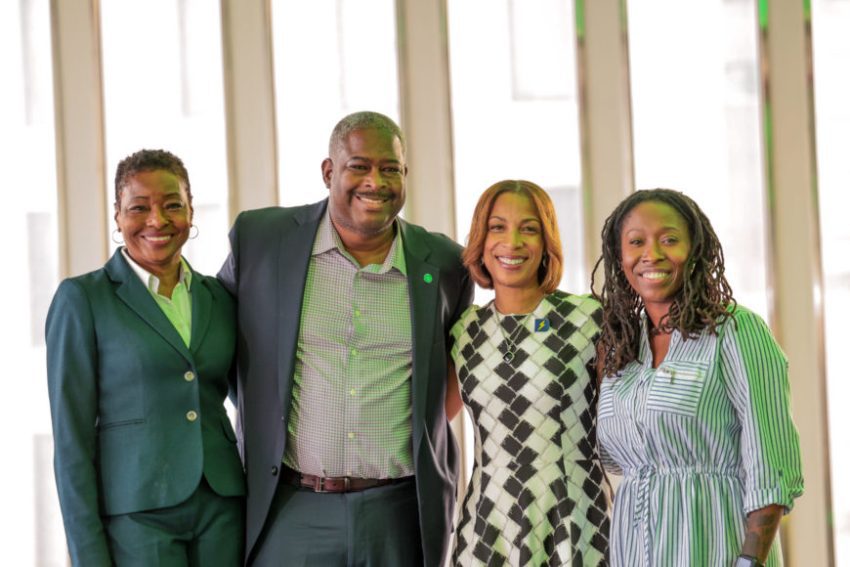The Michigan Chronicle
Oct. 10, 2022
Sherri Kolade
It’s a new era for Motor City 2.0.
In a city that pulled itself up by its bootstraps shortly after the turn of the 20th century, a hardworking, growing labor force began to manufacture cars and subsequently built its respected automotive culture that the world has come to know.
Detroit became an automotive industry giant when “The Big Three” automakers, Ford, General Motors, and Chrysler came on the scene shortly after 1910.
Detroit’s Motor City nickname had staying power as the booming automotive industry, over time, attracted millions of immigrants. In addition to newcomers and longtime residents — and those who hailed from the south (during the Great Migration) – these determined Detroiters began working in this space where there was enough room for everyone to earn a living. Yet, despite the city’s rich and admirable automotive legacy, Black people, many times, were left out of the conversation and were not truly seen as true contenders in this field – until now.
The newly formed, Black-owned and operated Blacks in Electric Vehicle Infrastructure Trade Association (BEVI) has entered the chat and is the first-of-its-kind entity with prominent local companies pooling their talents together. BEVI, launched at the North American International Auto Show Edition in mid-September, is poised to make access to expert, diverse talent easy and ensure representation in the (electric vehicle) EV boom, according to a press release.
Created with a resolve to advance the equitable, inclusive, and sustainable presence of Black suppliers in the global EV infrastructure marketplace, co-founders Natalie King’s Dunamis Charge, Los Angeles-based Kameale C. Terry’s ChargerHelp!, Carla Walker-Miller’s Walker-Miller Energy Services, Kwabena “Q” Johnson’s PlugZen, and William McCoy’s Vehya recently announced the official formation of BEVI.

BEVI is not only an acronym but a play on words with the word, “bevy,” meaning a large group of people or items of a particular kind.
King came up with the name.
“When I think of bevy I think of abundance and love it,” Walker-Miller, founder and CEO of Detroit-based Walker-Miller Energy Services, (one of the largest African American- and woman-owned energy waste reduction firms in the country) told the Michigan Chronicle.
Walker-Miller added that she wants the trade association to create an abundance of resources with (and for) Black professionals in this space where there currently is not. “The complaints we hear all the time is, ‘We can’t find people. We can’t find Black people in … whatever the field is. That is one reason for forming BEVI. It was so that no one could say … (we) can’t find Blacks in this infrastructure.”
She added that the second reason for forming BEVI was to offer a collective voice in influencing the EV infrastructure and who has access to it.
“It is one of the things that keeps me up at night,” she said, adding that Johnson, the brainchild of BEVI, and she collaborated in the EV space 10 years ago. Also, through a past Michigan Chronicle Pancakes & Politics clean energy event (where she was a panelist) earlier this year she invited co-founders Johnson, Dunamis, and McCoy to attend, too.
“I … gave them a shout-out from the stage. I don’t think most people realize Black people have really dedicated themselves to this industry,” Walker-Miller said, adding that moment in time “was the beginning” of the four of them becoming a collaborative force.
Johnson, founder of Plug Zen, a Detroit start-up electric vehicle manufacturer, told the Michigan Chronicle previously it’s about recognizing the value of minority-owned businesses in this conversation.
“If you’re going to use equity diversity, and inclusion,” said Johnson, “Everyone has to be in on it. If you look at that panel, some of us should have been on that stage. That’s what engagement looks like.”
Johnson said one of the gaps in community needs when it comes to infrastructure planning for EVs is the inconvenience of charging stations that are planned to be spaced at every 50 miles.
“We need to focus on public level 2 charging stations,” said Johnson, “Places where people will convene like community centers and parks. Any place where your car is going to sit for more than two hours. It creates the incentive for business and property owners to get involved.”
The manufacturing ecosystem of the automobile spawned great generational wealth for many majority families and created America’s middle class. This is an important stride toward ensuring that all capable, exceptional, EV technology experts of all races have access to the unprecedented economic benefits that will be created by the proliferation of the EV industry.
The nascent trade association has an intentional mission to align African American-owned and operated companies specializing in the manufacturing, installation, maintenance, repair, diagnostics, resell, and distribution of Electric Vehicle Supply Equipment (EVSE).
In addition to making MBE-certified and other black-owned EVSE companies more centralized and procurable to key trade stakeholders, the BEVI Trade Association will host conferences, forums, and fireside chat discussions.
An MBE Certification is the process by which a business is verified as being minority-owned, managed, and controlled according to the criteria set forth by the National Minority Supplier Development Council (NMSDC).
BEVI topics will include:
- Education
- Community Outreach & Engagement
- Contract Procurement
- Environmental Justice
- Connecting to Disadvantaged/Underserved Communities
- Public/Private Partnerships
- Policy Making
- Advocacy
With massive growth projected for the EV industry in the next 10 years and beyond, the “clean technology trailblazers” are in lockstep in their goal to ensure that Black people have a seat at the EV table and a fair opportunity to contribute to initiatives and innovation in EV arenas, according to a press release.
With the organization of BEVI, that goal is one step closer to being realized.
McCoy is the founder and CEO of Vehya. The company is championing EV adoption through infrastructure and workforce development. Vehya is a startup based in Detroit, playing a big role in recruiting, training and deploying the green power workers of the future – electricians who will be needed to install and maintain EV chargers across the country.
McCoy told the Michigan Chronicle that the “synergy” behind BEVI is growing and building into a momentum where others are catching on.
“People are realizing what we do and (we are) a key part of the supply change and people are saying, ‘You fixed our problem,’” McCoy said.
Electric vehicles are becoming more popular each year as gas prices continue to rise and drivers want to reduce their environmental impact, and as automakers produce more affordable options. Over the coming decade, it’s estimated that 15% of all drivers will be using electric cars, which translates to a growing market in the EV space for businesses – along with a continued push for equity and representation in this evolving field, which is where BEVI comes in.
King told the Michigan Chronicle that BEVI is here for bridging the gap.
“BEVI really is the birthing of a need that we as Black business, owners, Black innovators, and entrepreneurs in this EV industry see,” King said. “It’s a resulting effort to fill a gap.”
King added that one of her co-founding members refers to the electric vehicle industry (and resulting industries) as the next industrial revolution in this country and around the world, and she couldn’t agree more.
Also, BEVI is more than prepared to address the historical underrepresentation in the auto industry and to “carve a place” in this space in order to create wealth generation and a legacy for many years to come with EVs and EV infrastructure.
“We know that there are trillions and trillions of dollars that will result from this industry and BEVI’s goal is to make sure there is inherent equitable and there is …social and economic parity with respect to participation and opportunity in this industry,” King said.
Legislation like the Bipartisan Infrastructure Law [BIL] and the Justice 40 Initiative are providing pathways toward equitable distribution of federal investments in climate and clean energy to disadvantaged communities, to grow the economy sustainably and equitably, which is important when it comes to the Black and Brown communities being not forgotten in the EV movement.
King said that reducing barriers to EV fears and increasing reliability factors surrounding EV chargers is crucial, along with equitably building out EV infrastructure, including charging stations in Black and Brown communities.
“Another barrier is education, especially for Black and Brown communities and low-income communities,” she said of underrepresented communities that don’t always think electric vehicles are for them because of price points and accessibility.
“People see a Tesla down the street and think it is for high-net-worth people,” she said, which is not true.
Walker-Miller agrees.
“I see an energy divide created with people who can afford EVs,” she said. “We are distinguishing ourselves by being on the front end.”
She added that affordability in EVs in the long run (with lower maintenance costs) trumps the upfront costs in comparison to traditional vehicles that are sometimes costly over time.
Walker-Miller added that Detroit’s economic base was built on the automotive industry and why tens of thousands of families became wealthy – not only from manufacturing but supplying the car industry from servicing parts to advertising.
“Black people were left out of that opportunity for generational wealth creation – we got jobs but we weren’t in a position to start (a business) and we still aren’t for the most part,” she said adding that the EV field is chock full of opportunities, “If we really latch on to electrification and the mobility transformation.”
“We should be innovating – Black people are innovators by nature,” she said. “We should be figuring out every opportunity … and creating and expanding businesses to serve it.”
King said that the next step with BEVI is membership rolling out a membership campaign for the national organization that is setting its sights on becoming known worldwide.
“Ultimately, we want it to be international, reaching multiple countries that have Black entrepreneurs that are in this space – this is a global opportunity,” King said, adding that it’s about connecting with other organizations and also attracting the next generation now. “We want to attract HBCUs, and high school students and tap into the next pool of talent. … We’re going to provide the platform … to make a huge impact and add value to the industry.”

